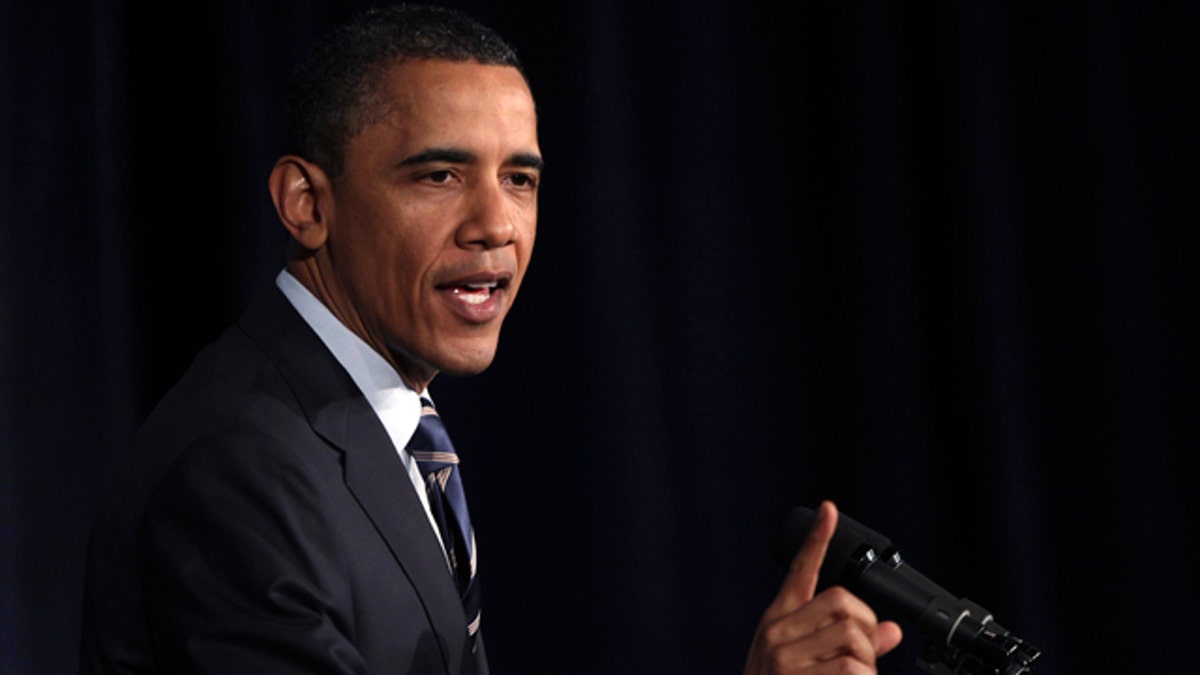
(Reuters)
While deficit commission co-chairman Alan Simpson suggests prayer is the answer to finding long-term debt reduction, President Obama is counting on a small group of senators to turn his 2012 budget proposal submitted two months ago into a long-term plan to reduce the government's tab.
That's no easy task. The president's budget submission in February allows for a $1.2 trillion deficit in 2012 alone, and $9.4 trillion additional debt over 10 years, according to an analysis by the Congressional Budget Office.
But after continued reports of record-breaking debt numbers and a proposal from House Budget Committee Chairman Paul Ryan to reduce debt by $6.2 billion over 10 years, the president this week outlined his own offering -- a plan that called for $4 trillion in savings over 12 years, in part by increasing current tax rates for families earning $250,000 or more.
"It is a balanced plan that asks for shared sacrifice in order to provide shared opportunity for all Americans," Obama said Thursday after a meeting with his deficit commission co-chairmen.
The proposal doesn't come with any new budget revisions being sent to Congress, a decision that was not an afterthought, according to the Office of Management and Budget.
"The 2012 budget already exists," an OMB spokeswoman told Fox News on Thursday. "The framework outlined yesterday builds on the president's 2012 budget to provide a comprehensive, balanced approach to deficit reduction. The president's goal was to lay out his vision, not to write specific legislation or present every detail and say take it or leave it. This charts a path forward."
That decision didn't please the Senate Budget Committee ranking Republican Jeff Sessions, R-Ala.
"The president has obviously recognized that the budget he submitted was inadequate," Sessions told FoxNews.com. But instead of offering a revised budget, which is required by the Congressional Budget Act, Obama is taking the stage to try to discredit Ryan, he said.
"They have no intention of actually following through the speech with concrete proposals that Congress can evaluate," he said. "The idea he's proposing can't be evaluated because it's just talk."
Without a revised budget, getting from Obama plan 1.0 to Obama plan 2.0 appears to be a task left at the doorstep of the Gang of Six -- three Republicans and three Democrats who served on the failed deficit panel but are committed to looking for a middle ground on debt reduction.
Jack Lew, the president's budget chief, called it a "significant challenge" to get "from here to where we need to go," but said the most popular commentary in Washington is to say it's impossible to reach an agreement.
"When Congress gets back ... the vice president will meet with leaders and lay out the issues that they need to work through, with a pretty tight deadline, with the goal of having progress by Memorial Day" and a vote in June, he said.
"The important thing is that we have action," said Erskine Bowles, a deficit commission co-chairman who met with Obama and his co-chairman Simpson on Thursday.
Calling the Gang of Six "very brave, bold senators," Bowles said it will likely be up to it to come up with legislative language for a vote.
"I don't think anybody has a crystal ball, but I do think we have a framework set up," he said. "Every single plan is talking about $4 trillion of deficit reduction. That's the key and now what we have to do is take the best ideas out of all plans and get to real action."
"I think they will put out their plan, and then if anybody else wants to put in a plan we suggest that they do so, and that would be a wonderful thing, and then we'll just mess around the plans and see where's the best results," Simpson added.
But their confidence belies the trouble the Gang of Six is having reaching an agreement.
Sen. Kent Conrad, D-N.D., a member of the Gang of Six, told Fox News that everything is on the table -- entitlements, domestic spending and revenue in the form of tax reforms.
But Conrad, who as Budget Committee chairman is responsible for submitting a Democratic budget in the Senate, said he's been holding off so as to give every chance for the group to come together.
"I think that's what's required at the end of the day," he said. "Look, neither party can do this on its own. This is a circumstance in which one party controls the House, one controls the Senate. Of course the president has his own views, so if we don't come together, nothing is going to happen."
But Sessions said he's perplexed by the decision to leave it to six senators unknown to most of America.
"The Gang of Six, I'm not sure how they were selected or how they're expected to perform, and we have no confidence they will reach any agreement," he said, adding that maybe it could come up with some ideas, but the group is limited in latitude. "They're not able to do much more than sit around a room and give and take a little bit."
Ryan, R-Wis., whose legislation is expected to get a House vote before Congress leaves this week for a two-week spring break, said he's more encouraged that his bill will pass now that the president has failed to lead with a revised budget and offered what he described as a slanted speech to the nation.
"When the commander-in-chief sort of brings himself down to the level of the partisan mosh pit that we've been in, that we are in, it makes it more difficult to bring that kind of leadership," he said.




